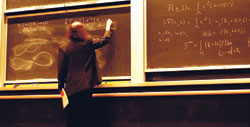Who would turn down a $1 million prize for solving a math problem?
Perhaps the smartest man in the world.
Three months ago, a famously impoverished Russian mathematician named Grigori Perelman was awarded the prestigious $1 million Clay Mathematics Institute Millennium Prize for his groundbreaking work -- having solved a problem of three-dimensional geometry that had resisted scores of brilliant mathematicians since 1904.

The genius at work |
Thursday, the institute announced that Perelman, known equally for his brilliance and his eccentricities, formally and finally turned down the award and the money. He didn't deserve it, he told a Russian news service, because he was following a mathematical path set by another.
The president of the Clay Institute, James Carlson, said that Perelman was a mathematician of "extraordinary power and creativity" and that it was he alone who solved the intractable Poincaré's conjecture. "All mathematicians follow the work of others, but only a handful make breakthroughs of this magnitude," Carlson said.
Still, while he had been hopeful that Perelman would take the prize, he was hardly surprised that he did not. Perelman had already turned down several of the world's top awards in mathematics. And when he solved the Poincaré conjecture, he ignored the peer-review process and simply posted his three-part solution online. That was in 2003.
It took other mathematicians two years to determine that he had indeed solved the problem. "The community knew about Perelman, and that's why they took him seriously," Carlson said. "But what he did is definitely not the way things are normally done."

Perelman's aversion to public spectacle and to riches is mystifying
to many |
Immediately after his postings, Perelman was invited to lecture at several top American universities, and did so with aplomb. Speaking in fluent English, he wowed his math colleagues and, after returning to Russia, continued to communicate via e-mail with some about his work. Within several years, however, he stopped responding and left the math world, Carlson said.
"I went to St. Petersburg almost two years ago and I did get him on the phone," Carlson said. "I told him I'd like to meet, but he said it 'wasn't necessary at this time.' "
Perelman lives in a bare-bones apartment in St. Petersburg with his elderly mother; a poor and reclusive man with long, wild hair and, in his photos, a look of fierce pride. Carlson said that when he spoke with Perelman, the man had quit his research and teaching job at Russia's top institute and did not appear to have other employment.
The Poincaré conjecture, named after prominent French mathematician Henri Poincaré, involves a complex problem in the field of topology -- an important area of math that studies the enduring properties of objects that are stretched or otherwise deformed, but not torn or otherwise reconstituted. Scores of prominent mathematicians tried to solve it over decades but failed, leading to its characterization as the Mount Everest of math.
The $1 million prize was to be the first of seven Millennium awards given out by the Cambridge, Mass.-based Clay Institute to mathematicians who master long-unsolved problems. The program was established in 2000 and an award will only be made if one of the seven selected math problems is resolved.
Perelman, 43, did not show up for the early June ceremony in Paris where his prize was to be awarded. Author Masha Gessen, who wrote a book about Perelman, told the prize committee earlier this year that Perelman would not attend the Paris event, but said he had not decided whether to accept the prize money.
The Poincaré conjecture was updated over the years and one of its modifiers, William Thurston, said at the ceremony in Paris that "Perelman's aversion to public spectacle and to riches is mystifying to many. I have not talked to him about it and I can certainly not speak for him, but I want to say I have complete empathy and admiration for his inner strength and clarity, to be able to know and hold true to himself. . . . We have learned from Perelman's mathematics. Perhaps we should also pause to reflect on ourselves and learn from Perelman's attitude toward life."
In 2006, Perelman turned down another coveted award in mathematics, the Fields Medal, which honored "his contributions to geometry and his revolutionary insights into the analytical and geometric structure" of topology. The journal Science credited Perelman with the scientific breakthrough of 2006, the first time a mathematician had been recognized.
Still, Perelman was quoted by the Interfax news service this week as saying he believes his contribution in proving the Poincaré conjecture was no greater than that of American mathematician Richard Hamilton, who first suggested a pathway toward the solution.
The Clay Institute was founded in 1998 by Boston businessman Landon T. Clay and his wife, Lavinia. Its mission statement says the institute was formed "to increase and disseminate mathematical knowledge." On its Web site, the institute says its leaders will make an announcement this fall about how the prize money will be used to benefit mathematics. Courtesy Washington Post
|



